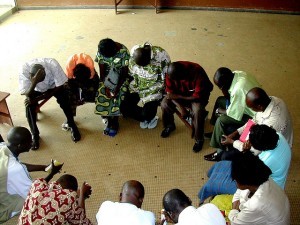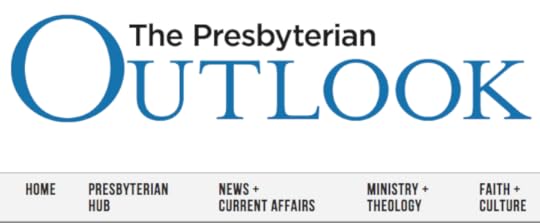Gary Neal Hansen's Blog, page 48
October 6, 2015
Helping Christian Community Thrive: Drawing Close to God

 Team Prayer Contou, cc by Brian Kelley 2.0
Team Prayer Contou, cc by Brian Kelley 2.0If you call your faith “a personal relationship to God” you already know it is true: You should be drawing close to God. How can you say you have a relationship that matters if the two of you don’t spend time together?
There’s a name for drawing close to God. It’s called praying.
Christians used to know how important prayer is. In Acts 2:42 it is the fourth key practice that marked the thriving early Christian community:
They devoted themselves to the apostles’ teaching and fellowship, to the breaking of bread and the prayers.” (Acts 2:42, NRSV)
In some denominations, and in some parts of the world, they still do know it. Take the churches in Korea where the passion is so strong they’ve been known to set aside a whole mountain as a place of prayer.
By the way, they are busting at the seems, those Korean churches.
You will hear people observe that congregations that grow and experience renewal have some things in common. Prayer is always on the list.
And it makes sense.
Prayer, conversation or communion with God, is the very substance of a relationship with God. No individual Christian can grow or thrive without it.
We need God’s help if we want our churches to grow and thrive. Prayer is where we ask him to act.
It’s a message most churches desperately need to hear.
I teach on prayer at a seminary, in online classes, and in churches. People often say their prayer life needs a lot of work. They lack confidence. They can’t work prayer into their schedules. They frankly don’t know how to start.
It is actually pretty rare to find people who have an active prayer life — a life-giving regular practice of drawing close to God, sharing all that is on their heart, and listening to God’s side of the conversation.
There are lots of excellent ways to get started in prayer. In my book Kneeling with Giants I detail ten of them, each with deep roots in a major branch of the Christian faith. (You can get a copy here.)
What is interesting to me is that the Acts community was not just committed to
prayer
but that they devoted themselves to
the prayers.
That is an interesting turn of phrase. It indicates some known set of prayers, written or oral. It is not how we Protestants talk about prayer today, because we assume all good and true prayer is spontaneous.
Not so for the first Christians.
So what were “the prayers” for the members of this first Christian community?
It is too soon for them to have had the liturgy — even if the Liturgy of St. James evolved early, it surely wasn’t rarin’ to go right after Christ’s ascension. But they had other resources.
They had the prayer Jesus taught them.
Jesus had said to the disciples
When you pray, say…
followed by what we know as the Lord’s Prayer. Surely they learned it by heart, even if Matthew and Luke disagree about the wording.
Surely they followed Jesus’ instruction and said exactly that prayer — or as Martin Luther would teach centuries later, maybe they used the lines of the Lord’s Prayer as topics for their meditations and confessions and intercessions.
Surely, though, they prayed “the prayer.”
They had the Psalms.
As well as the Lord’s Prayer they had the Old Testament. (Back then they just called it The Bible.) And part of the Bible is the book of prayers and hymns sung to God in worship: the Psalms.
Surely these Acts Christians, already knowing the Psalms, prayed them with new eyes and ears. On every page they would find traces of Jesus who had fulfilled the promises of the ancient texts.
Perhaps, like John Calvin fifteen centuries later, they studied the Psalms and found their own heart’s needs expressed as they prayed them.
Perhaps like the Desert Fathers and Mothers who would come in just a couple centuries, they memorized the Psalms and recited them as prayer.
One way or another they prayed “the prayers.”
They had the daily and Sabbath prayers from their Jewish upbringing.
The first Christians were, after all, Jews. Acts tells us they continued going to the Jerusalem temple and to synagogue. There, as Jews (Jews who had found the long-awaited Messiah) they prayed the Jewish prayers — which include lots and lots of Psalms.
I don’t know the history in detail, but Jewish people came to practice a cycle of regular daily prayer, morning, midday, and evening. Alone or in gatherings of a dozen or more, they would talk to God using “the prayers.”
Eventually they had the Divine Office.
Over time the Church evolved its own cycle of prayers, including the Lord’s Prayer and the Psalms.
You can find a modern version of the Office in the Catholic Liturgy of the Hours or the Anglican Book of Common Prayer.
If you try it, you’ll soon discover the advantages of praying “the prayers.” Even if you are praying alone in your living room, you’ll know that Christians around the world are also praying those same prayers at the same time.
You will be praying with the Church.
So what about communities?
Useful as these ways of praying are for individuals, this is not about your personal prayer life. This is about your Christian community’s prayer life.
One of the practices that helped the first Christian community thrive was a shared prayer life. They didn’t just individually pray a lot. They had something they all understood when they talked about “the prayers.”
Your Christian community needs a shared practice of prayer.
It is not enough that a few individuals are pillars of prayer. The leadership needs to teach a way of prayer.
————
Is prayer a struggle for you?
From time to time I offer classes based on the life-changing approaches to prayer in my award-winning book Kneeling with Giants (InterVarsity 2012).
Click the button and I’ll let you know when the next one is coming.
(This post contains affiliate links.)
The post Helping Christian Community Thrive: Drawing Close to God appeared first on Gary Neal Hansen.
October 1, 2015
Letters to a Young Pastor: A Sound Investment Strategy

 Dear ______:
Dear ______:
Of course! I’m happy to tell you the story of how I came to believe that I was called to ministry. I thought you’d never ask. It all comes down to a parable and a sound investment strategy.
The process started back as an undergrad at the University of Washington. I was heavily involved in the university ministries department (affectionately “UMin”) at University Presbyterian Church. My pastor and mentor was the late Steve Hayner — he went on to be president of InterVarsity Christian Fellowship and of Columbia Theological Seminary.
Steve opened doors for me to learn and serve, so that by my senior year I was chair of the leadership team for a ministry training small group leaders for Bible studies and prayer groups across the campus. I was teaching regularly. People were coming to me for counsel and support.
I was absolutely loving ministry.
I wanted to head off to seminary.
I had one problem: I had never heard the voice of God telling me I was “called.”
The year after graduation was my chance to put it to the test. I was offered a volunteer internship at First Presbyterian Church in Berkeley under someone else Steve had mentored: Mark Labberton, now the president of Fuller Theological Seminary.
I had majored in Business Administration. Mark found me a part time job as assistant business manager of a small grad school in Berkeley, “New College for Advanced Christian Studies.”
Doing both ministry and business provided clarity:
Ministry was life-giving. Administration sucked me dry.
If I’d known about St. Ignatius of Loyola, I’d have called these responses “desolation” and “consolations,” and done some discernment. Unfortunately, I didn’t.
But I still had a problem: No voice of God was telling me I was “called.”
For reasons I simply do not remember (call it the Holy Spirit), day after day I found myself meditating on Matthew 25:14-28.
You know the story: It is called the “Parable of the Talents.”
Rich guy goes on a journey.
Servants take charge of varying amounts of money.
Rich guy comes back.
Servants tally their profits.
Rich guy gives out rewards.
The measure of money was the Greek “Talent.” From that (huge) unit of money we get our English word for a personal aptitude or ability. The connection was not lost on me.
Lesson 1: The rich guy gave the servants total freedom.
The master did not give the slightest indication of what they should do with his money.
Maybe God gave me that kind of freedom too. Maybe I had some choice in what I did with my life. Maybe either ministry or business could be a God-pleasing option.
Lesson 2: Whatever the profit, the rich guy was pleased.
Whether the servant invested a lot or a little, whether the profits were large or small, the rich guy was pleased. I didn’t need to find the perfect choice. Maybe I could take a risk. Maybe I didn’t need to know in advance that investing my life would reap huge profits.
Lesson 3: The only action that bothered the rich guy was no action.
One fellow buried the money and just gave it back. That really ticked the rich guy off. Weeping and gnashing of teeth ensued.
I never did get a voice from on high telling me to go into ministry.
Instead I got some talents entrusted to me. What was very clear was that I needed to invest those talents. The choice was wide open. In the end, my Master would receive all the profit.
What I needed was a sound investment strategy.
I loved my Master. The question I had to consider was where I might invest my life’s resources to get the best gain for him.
That is the question for you too.
Every talent you have actually belongs to God. God has entrusted it to you. God is looking for his mission to profit by his investment in you.
Tally up your talents. Consider the options. Invest.
My advice? Stop looking for specific directions. Choose.
Blessings,
Gary
————
I’d love to hear from you in the comments! When was a time that you had to choose rather than following specific instructions? How did it work out?
This post is part of a series. To go to the beginning, click here.
The post Letters to a Young Pastor: A Sound Investment Strategy appeared first on Gary Neal Hansen.
September 28, 2015
Helping Christian Community Thrive: Going Deep With Christ
 Supper at Emmaus, Caravaggio (public domain)
Supper at Emmaus, Caravaggio (public domain)So you started a brand new Christian community. That’s great. How do you make sure people are going deep with Christ?
So your Christian community is diving into mission. That’s great too. How do you make sure they don’t burn out?
The earliest Christians in Acts had a great approach. They did what it took to keep growing–growing deep, growing strong and, along the way, growing in numbers.
I’ve been posting about the great scene in Acts 2 after Peter’s sermon on the first Christian Pentecost (here, here, and here). 3000 came to faith and joined the community in one single day. Luke makes a point of listing the things they did together, their priorities for daily life as Christians and as community:
They devoted themselves to the apostles’ teaching and fellowship, to the breaking of bread and the prayers.” (Acts 2:42, NRSV)
As well as committing themselves to biblical teaching, and building relationships that matter, a key priority was “the breaking of bread.”
This is another place that the NRSV is a tad misleading in its translation. You might think the text is just talking about sharing meals, since in a few verses it says they broke bread together in their homes.
They devoted themselves to the Eucharist, the Lord’s Supper.
Actually it is a reference to the Eucharist, the Lord’s Supper, Communion. You know: The sacrament that most of us Protestants participate in about once a month or quarterly. They devoted themselves to it.
How, you ask, do I know?
First, if it was a reference to ordinary meals for fellowship it would be a bit redundant.
More important, follow the trail of breadcrumbs in the text itself.
Here’s a more verbatim translation of this portion of the verse:
They devoted themselves…to the breaking of the bread
Then take a step backward in Luke’s writings, to the appearance of Christ at Emmaus. Actually the disciples did not know who the stranger was. Then,
When he was at the table with them, he took [the] bread, blessed and broke it, and gave it to them. Then their eyes were opened, and they recognized him; and he vanished from their sight. (Luke 24:30, NRSV, “the” added from the Greek)
That is the moment Carravagio captured in his amazing painting. Shock and wonder as they recognized Jesus, just before he disappeared.
How did they recognize him? When they returned to the other disciples,
they told what had happened on the road, and how he had been made known to them in the breaking of the bread. (Luke 24:35, NRSV, emphasis added)
Well why, do you supposed, their eyes were opened? What did they notice? Something happened that had already created a pattern in their memory:
he took [the] bread, blessed and broke it, and gave it to them.
They only had to look back to the time when Jesus was with the disciples in the upper room, just before the cross:
Then he took a loaf of bread, and when he had given thanks [eucharistesas], he broke it and gave it to them, saying, ‘This is my body, which is given for you. Do this in remembrance of me.’ (Luke 20:19, NRSV)
He took bread. He gave thanks. He broke. He gave. At Emmaus they recognized him because he did just what he had done last time they were together — when he gave them the Eucharist.
That’s going deep with Christ.
So if you want your community to do what the Early Church did, commit yourselves to celebrating the Eucharist. That’s the breaking of the bread.
But we Protestants don’t really do that.
If you are a Protestant, unless you are in a Lutheran, Anglican, or Disciples congregation this probably sounds pretty foreign.
I can hear the objections. We don’t really do that. Having the Lord’s Supper every week is “too Catholic.”
If we have the Lord’s Supper every week it will be just a ritual. It will lose its meaning!”
As one colleague said, tongue in cheek,
Yeah, just like golf, and sex.”
Better not do that very often.
We Protestants need to repent.
So for a whole lot of Christian communities in my tradition, devoting ourselves to the breaking of the bread is a totally radical idea.
But when I look at how we have lived our lives in comparison with the biblical model in Acts, the problem is clear: We have neglected one fourth of the core commitments.
We need to change our ways.
Is weekly Eucharist a quick fix?
Will it solve all our problems if we celebrate the Eucharist every week? Will we suddenly be on the road to health and growth?
No. Probably not.
But we will be building on a firmer foundation. We will be doing one of the things that mark a Christian community as authentically Christian — like part of the Church.
And you may be surprised at how it helps you go deep in your discipleship.
After all, this is where we really see and feel and know our connection to Christ. The Eucharist invites us into Christ himself as we receive what he said is his body.
The Lord’s Supper teaches us experientially that we are part of Christ’s own body. It reorients us to our core identity.
Get that message every week and you know who you are. You know whose you are. You are strengthened for all Christ calls you to do and be in the world.
————
I’d love to hear from you in the comments! How does receiving the Lord’s Supper affect your faith and discipleship?
The post Helping Christian Community Thrive: Going Deep With Christ appeared first on Gary Neal Hansen.
September 24, 2015
Letters to a Young Pastor: Looking Back to Find God
 cc 2.0 by Kevin Dooley
cc 2.0 by Kevin DooleyDear ______:
You make an interesting point. It is true that all these ways of finding God’s will are a bit indirect. We usually find ourselves looking back to find God has been there, nudging us in a particular direction.
Frustrating as it may be, I think that is the nature of biblical faith.
So, before going into another important approach to discerning God’s call, let me say something about why God is so indirect.
God is usually indirect.
It goes to who God is, and who we are as God’s creation.
As people of faith we live with a paradox. The most important relationship of our lives is with someone we can’t see, or touch, or hear.
God made everything in creation — God made your senses, and God made everything your senses can perceive. If you can sense it, it isn’t actually God.
We are the drawing, trying to connect to the artist.
That makes our relationship with God a little like that of a newspaper cartoon with the the artist who drew it. The cartoon people live on paper, in two dimensions. They are totally incapable of perceiving life in the artist’s world of three spacial dimensions.
And if the cartoon characters were made suddenly 3-D, they still wouldn’t grasp the artist’s world of movement in time.
The wonder, the paradox, is that God the Artist reaches down into our world. We find the traces all around us. But we can’t grasp God’s world at all. Created beings don’t have the senses or mental categories to grasp the creator of senses and minds.
You get glimpses of this in Scripture. I’ll mention two:
Israel’s God is invisible.
First is in Exodus 25, where God is giving Moses the instructions on how to make the Tabernacle, the first place of worship for Israel. In the holy place there is to be a box called the “ark” for the Ten Commandments. Above the ark are to be two “cherubim.” These are golden creatures one on either side with their wings stretching across over the ark. Their wings form the “mercy seat,” a kind of throne for God.
That is where Moses would go to meet with God: standing before a throne that to all appearances was completely empty.
This would have been a total contrast to people’s expectations. All the nations back then had temples, and their gods were there for all to see.
I think God was making a major point by this: God is not a convenient statue who can be moved around at will. God is free and unpredictable. God, like Aslan, in C.S. Lewis’ The Lion, the Witch, and the Wardrobe, is not safe — but he is good.
Even Moses wasn’t able to see God’s face.
The second biblical scene is from Exodus 33. Moses has spent a lot of time on the mountain, in the cloud, getting direct instructions from God. But he really wants to see.
Show me your glory, I pray.’ (Exodus 33:18, NRSV)
God says it is impossible.
you cannot see my face; for no one shall see me and live.’ (Exodus 33:20, NRSV)
But God makes a deal with Moses. God hides Moses in a rocky mountain crag until God’s glory has passed by. Then Moses can look and see God’s back.
That’s the picture of life for people who want to see what God is doing, or who want hear directly from God. We don’t know what we are asking for. If we saw God directly we’d drop dead.
Guidance comes from looking back to find God was there.
The good news is that if, like Moses, we keep looking, we can see where God has been. The traces are all around us.
That is what is happening when you listen using the “examen“ or the “prayer of the senses” taught by St. Ignatius, or when you listen to both the internal call and the external call as taught by John Calvin, or when you listen to heart’s gladness and the world’s need as taught by Frederich Buechner.
Keep looking back. If you keep listening and keep looking you will know that God has been there. And you’ll be able to follow.
Blessings,
Gary
————
I’d love to hear from you in the comments! When have you looked back in your life and seen that God had been there?
This post is part of a series. You can start at the beginning by clicking here.
(There is an affiliate link to Amazon in this post.)
The post Letters to a Young Pastor: Looking Back to Find God appeared first on Gary Neal Hansen.
September 23, 2015
Can You Help Brainstorm a Book Title?
 cc by r. nail bradshaw 2.0
cc by r. nail bradshaw 2.0If you’ve stopped by my blog much in the last few months you will probably have seen posts in my “Letters to a Young Pastor” series.
I’m near the end of the pre-seminary phase of my correspondence. Now I am aiming to turn the letters into a small book.
Brainstorm a book title with me?
I’m really excited about the project, but I need a title. Can you help me with some ideas?
I know two things:
1. People have been really enjoying the posts.
I can tell because they have been getting a lot of Facebook shares, and because I’ve had a good bit of correspondence in the background.
2. The title isn’t working at all.
I can tell because even though people share the posts, not that many people click through from the shares.
I’m no whiz at headlines. Maybe you are. Can you make a suggestion? Here’s what I need:
A title that captures the essence of these letters
A title that piques the curiosity of potential readers
A title that is short enough to be legible at thumbnail size on Amazon
If you want to read through the series and give it a thought, you can go to start here and click from post to post.
I’d be so grateful if you put your suggestion in the comments! If I choose yours I’ll be sure to get you a copy when it comes out…
The post Can You Help Brainstorm a Book Title? appeared first on Gary Neal Hansen.
September 22, 2015
What Does It Mean to Honor Your Father and Mother? (Heidelberg Catechism Q104)
What does it mean to honor your father and mother?
I was recently invited to contribute a guest column for the magazine Presbyterian Outlook. I decided to write about one of the Ten Commandments: the often misunderstood call to honor your father and mother. What does it mean to honor our parents?
If you’ve been here often it won’t surprise you to find that I did this in conversation with the Heidelberg Catechism, the much-loved and widely-used 450 year old summary of biblical Christianity.
Here’s how it starts:
When Moses came down from the mountain, he brought with him some excellent advice. It has proved hard to apply. It goes against habit and apparent self-interest. Still, it is worth a listen.
Here is one countercultural bit:
“Honor your father and your mother, so that your days may be long in the land that the Lord your God is giving you” (Exodus 20:12).
A pair of American secular holidays would seem to remind us of this priority. Historically, we in the Reformed tradition try to apply it year round, and much more broadly. (To read more, click here…)
(This piece appeared in the Outlook’s regular “Benedictory” series, which is usually only available online for paid subscribers. They kindly opened this one up so I could let you see it. I hope you’ll consider subscribing to get more of their great content!)
————
I’d love to hear from you in the comments! What do you think of as good ways to honor your parents? What makes it a challenge in today’s world?
The post What Does It Mean to Honor Your Father and Mother? (Heidelberg Catechism Q104) appeared first on Gary Neal Hansen.
September 18, 2015
Letters to a Young Pastor: Your Deep Gladness and the World’s Deep Need
 Wishful Thinking on Amazon (affiliate link)
Wishful Thinking on Amazon (affiliate link)Dear ______:
Yes! I did promise some better approaches to hearing God’s call. Sorry to belabor the ones that aren’t so spiffy.
One of my favorites comes from Presbyterian theologian and novelist Frederich Buechner:
Neither the hair shirt nor the soft berth will do. The place God calls you to is the place where your deep gladness and the world’s deep hunger meet.
Now that is flat out great stuff, both poetic and true. (He says it in a very winsome and whimsical book, Wishful Thinking: A Theological ABC [retitled “a Seeker’s ABC” in the revised edition]. You’ll find it under “V” for “Vocation.”)
But what does it mean? Usually people quote just the second sentence, and that really is the heart of the matter. But taken together the little paragraphs makes several excellent points.
When we pick a path that we think will please God we often jump to silly conclusions.
Some put on a “hair shirt.”
Back in the day, a lot of Christians thought they needed to basically punish themselves for things they had done to offend God. So they would put on a “hair shirt,” scratchy goat’s hair righ on their skin. That would help them feel crummy all the time, and that would remind them that they were really really sorry for their sins.
These days it is more of a metaphor. Think of undergraduates who are afraid to go to “Urbana,” the huge IVCF missions conference, because they are convinced God will call them to someplace horrible.
If you define serving God as suffering, you are wearing a “hair shirt.”
And that says our assumptions about God’s character are pretty rotten. Is God really out to make your life miserable? No.
Some seek a “soft berth.”
On the other end of the spectrum we have the “prosperity gospel” in all its variants. Like they guy I saw in a late night infomercial who promised financial rewards for special prayers, or contributions, or some such.
One woman testified that when did what was asked, the next day a check arrived for $15,000. The preacher turned to look right into the camera and asked, “What could YOU do with an extra $15,000?”
More often it is subtler: we assume that God is going to call us to the happiest paths. We seek the easiest, most pleasurable life, and call that God’s will.
This too shows some crummy assumptions, particularly about God’s priorities.
Is it important to God that you become rich? Probably not. Thinking riches will make you happy is an illusion. It certainly isn’t guaranteed to make you generous, or loving or otherwise like Christ.
To hear God’s call you do need to listen to your life.
Even if feelings of guilt or greed can misguide you, your feelings are not irrelevant. God created you in his own image, and he is busy now restoring that image in you. God will surely use all that he created and redeemed to help you grow and follow — including your perceptions, your feelings and your thoughts.
To hear God’s call, you need to find “your deep gladness.”
So as you live your life you need to pay attention to the things that fill you with joy. Sometimes that joy is the sign that you are doing what you were created to do in the first place. Sometimes it means you are using gifts God put in you to fulfill his purposes.
Now if you find that it gives you joy to harm others, or to otherwise wreak havoc in God’s good creation, that is not so good.
But if what you love doing can actually help accomplish the things God wants done, then — WOW!
To hear God’s call you need to listen to “the world’s deep hunger.”
So at the same time as you are learning what brings you joy, listen to the world God loves so much.
What if you listened with care to the world? What if you heard the cries of the oppressed, the poor, the enslaved? What if you discovered some way that what brings you joy could actually help them?
And in fact there are countless ways to help people grow, to lessen the suffering that destroys souls, to bring light into dark places.
Find work that is both, not one or the other.
It isn’t just preachers. I’ve known of accountants and florists, writers and lawyers, custodians and police officers who do what they do because their deep joy meets some part of the world’s deep need.
In this complicated interconnected age, there is some way, some where, for just about every kind of joyful gift to become a serious and sustaining calling.
So that’s my suggestion for you: Find your deep gladness. And listen to the world’s deep hunger. Find the place they overlap. Then jump in.
Blessings,
Gary
————
This post is part of a series. To start at the beginning, click here. To go to the next installment, click here.
(By the way, this post contains affiliate links to Amazon.)
The post Letters to a Young Pastor: Your Deep Gladness and the World’s Deep Need appeared first on Gary Neal Hansen.
Letters to a Young Pastor: Your Deep Gladness, the World’s Deep Need
 Wishful Thinking on Amazon (affiliate link)
Wishful Thinking on Amazon (affiliate link)Dear ______:
Yes! I did promise some better approaches to hearing God’s call. Sorry to belabor the ones that aren’t so spiffy.
One of my favorites comes from Presbyterian theologian and novelist Frederich Buechner:
Neither the hair shirt nor the soft berth will do. The place God calls you to is the place where your deep gladness and the world’s deep hunger meet.
Now that is flat out great stuff, both poetic and true. (He says it in a very winsome and whimsical book, Wishful Thinking: A Theological ABC [retitled “a Seeker’s ABC” in the revised edition]. You’ll find it under “V” for “Vocation.”)
But what does it mean? Usually people quote just the second sentence, and that really is the heart of the matter. But taken together the little paragraphs makes several excellent points.
When we pick a path that we think will please God we often jump to silly conclusions.
Some put on a “hair shirt.”
Back in the day, a lot of Christians thought they needed to basically punish themselves for things they had done to offend God. So they would put on a “hair shirt,” scratchy goat’s hair righ on their skin. That would help them feel crummy all the time, and that would remind them that they were really really sorry for their sins.
These days it is more of a metaphor. Think of undergraduates who are afraid to go to “Urbana,” the huge IVCF missions conference, because they are convinced God will call them to someplace horrible.
If you define serving God as suffering, you are wearing a “hair shirt.”
And that says our assumptions about God’s character are pretty rotten. Is God really out to make your life miserable? No.
Some seek a “soft berth.”
On the other end of the spectrum we have the “prosperity gospel” in all its variants. Like they guy I saw in a late night infomercial who promised financial rewards for special prayers, or contributions, or some such.
One woman testified that when did what was asked, the next day a check arrived for $15,000. The preacher turned to look right into the camera and asked, “What could YOU do with an extra $15,000?”
More often it is subtler: we assume that God is going to call us to the happiest paths. We seek the easiest, most pleasurable life, and call that God’s will.
This too shows some crummy assumptions, particularly about God’s priorities.
Is it important to God that you become rich? Probably not. Thinking riches will make you happy is an illusion. It certainly isn’t guaranteed to make you generous, or loving or otherwise like Christ.
To hear God’s call you do need to listen to your life.
Even if feelings of guilt or greed can misguide you, your feelings are not irrelevant. God created you in his own image, and he is busy now restoring that image in you. God will surely use all that he created and redeemed to help you grow and follow — including your perceptions, your feelings and your thoughts.
To hear God’s call, you need to find “your deep gladness.”
So as you live your life you need to pay attention to the things that fill you with joy. Sometimes that joy is the sign that you are doing what you were created to do in the first place. Sometimes it means you are using gifts God put in you to fulfill his purposes.
Now if you find that it gives you joy to harm others, or to otherwise wreak havoc in God’s good creation, that is not so good.
But if what you love doing can actually help accomplish the things God wants done, then — WOW!
To hear God’s call you need to listen to “the world’s deep hunger.”
So at the same time as you are learning what brings you joy, listen to the world God loves so much.
What if you listened with care to the world? What if you heard the cries of the oppressed, the poor, the enslaved? What if you discovered some way that what brings you joy could actually help them?
And in fact there are countless ways to help people grow, to lessen the suffering that destroys souls, to bring light into dark places.
Find work that is both, not one or the other.
It isn’t just preachers. I’ve known of accountants and florists, writers and lawyers, custodians and police officers who do what they do because their deep joy meets some part of the world’s deep need.
In this complicated interconnected age, there is some way, some where, for just about every kind of joyful gift to become a serious and sustaining calling.
So that’s my suggestion for you: Find your deep gladness. And listen to the world’s deep hunger. Find the place they overlap. Then jump in.
Blessings,
Gary
————
This post is part of a series. To start at the beginning, click here.
(By the way, this post contains affiliate links to Amazon.)
The post Letters to a Young Pastor: Your Deep Gladness, the World’s Deep Need appeared first on Gary Neal Hansen.
September 10, 2015
Letters to a Young Pastor: What to Do at a Fork in the Road
 cc by Simon G – SA 2.0
cc by Simon G – SA 2.0Dear ______:
Yes, I suppose it is hard to just set aside your feeling that hearing God’s call is kind of scary. You’ve come to a fork in the road. You must choose. You might get it wrong.
What is the worst thing that could happen?
Yes, sometimes there are serious consequences.
In my first computer programming class the prof gave us a list of all the possible error messages. The one we didn’t want to see was
Program lost, sorry.
This was categorized, I think, as a
Catastrophic error.
I’ll say. If you got it after staying up all night writing that program you would too.
It sounds like you fear something like this as you attempt to hear and follow God’s call. If you get it wrong at the fork in the road, if you stray from that mysterious path, it feels like you’ll be lost in the woods forever.
What if I told you that you actually can’t get it wrong?
What if you could be absolutely sure that, no matter what you chose, you would not make a fatal error?
Let’s take a worst-case scenario. I’m thinking about some people who clearly made a very bad choice.
It is even a biblical example, so it comes with some spiritual oomph and authority. The actions the characters took were not the kid of thing God advises: they actually broke several of the Ten Commandments.
But I’m getting ahead of myself: when the story took place the Commandments hadn’t even been given yet.
Consider Joseph and his brothers.
The story is back in the early generations of God’s chosen people. Jacob, aka “Israel,” had twelve sons. Little Joseph was Daddy’s obvious favorite.
The other eleven were steamed about that.
Here’s what they did. They attacked Joseph, their own brother, and sold him to slave traders. Then they staged an elaborate cover-up to convince their parents that Joseph had been killed by a wild animal.
Commandments or no commandments, this is very bad behavior. Agreed?
So Joseph ended up in Egypt, got falsely accused of sexual assault, and was thrown in prison.
This is not getting better.
So far it is looking pretty grim, actually. God’s will wasn’t followed, and everything went down the tube.
But.
Eventually, Joseph was able to do something that helped the King of Egypt. Pharaoh got Joseph out of prison, and gave him a position of power and authority. Joseph ended up in charge of Egypt’s massive stockpile of grain in a time of great famine.
Joseph’s brothers came to Egypt to beg for permission to buy food.
Little did they know they would be begging it from long lost Little Joe.
Joseph strung them along for a while, having some private laughs. But when he couldn’t hide it any longer, Joseph, chief steward of Pharaoh’s riches, revealed his identity.
Eleven brothers figured they were toast. They had another surprise coming.
Joseph knew the God he served was the great Redeemer.
Getting out of prison had taught Joseph some excellent theology. Joseph knew that God takes really rotten stuff and brings amazing outcomes.
So when his brothers were terrified that Joseph was going to take his revenge, he turned the tables:
Even though you intended to do harm to me, God intended it for good, in order to preserve a numerous people, as he is doing today. (Genesis 50:20, NRSV)
Joseph knew that even though his brothers had made truly rotten choices, the God they served had bigger plans at work.
It is true for you too. God brings his intentions to full flower out of the most unlikely circumstances.
So assume you can’t make a truly fatal blunder.
Go to seminary? God will be at work. God will use you.
Take that job with the internet startup? God will be at work. God will use you.
You might make a bad choice. Chances are you’ll make quite a few of them along the way. Sometimes the consequence is suffering. Sometimes you may need to apologize and seek forgiveness.
Thankfully, with no perfect plan unfolding before you, there are still ways to make better choices. It is possible to choose “righter” paths and avoid “wronger” ones.
More on that next time.
Blessings,
Gary
————
I’d love to hear from you in the comments. What is a “bad” choice that you’ve seen God make “good” come out of?
————
This post is part of a series. To go to the beginning, click here.
The post Letters to a Young Pastor: What to Do at a Fork in the Road appeared first on Gary Neal Hansen.
September 9, 2015
Helping Christian Community Thrive: How Do You Build Relationships that Matter?
 by adventurejay, cc 3.0
by adventurejay, cc 3.0Do people really connnect with each other in your congregation? How do you build relationships that matter?
Imagine running a survey in your Christian community. Two question:
First, list the relationships you have that matter deeply to you — soul mates, heart friends, Starbucks buddies.
We’re only counting the handful of people with whom you share life. Which are the friendships where you hold each other up and help each other move forward in life?
Second, how many of that handful of people are in your congregation?
If a good number of those solid relationships are part of your Christian community, I suspect you are doing something right.
I suspect, though, that a lot of Christians would find that not many of their deeply supportive relationships are in their churches.
For many faithful Christians it is easier to find deep soul-nourishing connections outside their churches than in them.
The Fellowship
This is actually a very important little survey. It points to one of the very basic, elemental components of Christian community.
Over the last few weeks (here, and here) I’ve beek looking at the four commitments, or priorities, that the early Christian community in Acts committed themselves to. After that first Christian Pentecost, when 3000 were converted,
They devoted themselves to the apostles’ teaching and fellowship, to the breaking of bread and the prayers. (Acts 2:42, NRSV)
It is a bit misleading in some translations, like the NRSV, since “apostles’ teaching and fellowship” makes it look like they devoted themselves to “the Apostles’ … fellowship.” You can translate the Greek more straightforwardly by giving each the four commitments its own little “to the.”
Like this: They committed themselves
to the teaching of the Apostles’
and to the fellowship
to the breaking of the bread
and to the prayers
They committed themselves to the “fellowship,” or in Greek to “koinonia.” What does that mean?
The word has to do with sharing in something–it has the same root as the word used a few verses later to say they “had all things in common.”
But koinonia, or fellowship, is not primarily about material goods. It is about the connection we have with each other because each of us is connected to Christ. We share in Christ. We share in life together. Our lives are interwoven.
The Status Quo
I tend to spend most of my time in and around mainline Protestant ministries. If a congregation is happy about any possible marker of their health as a Christian community, they are most likely to say they are really good at fellowship.
But sometimes, at least to an outside observer, it looks like we are setting the bar fairly low.
Is the fellowship at our coffee hours and potlucks creating a sense that we are sharing life together? Are we building relationships that matter?
More Than the Culture
There is more than one way to look at it. What that outside observer needs to do first is compare the quality of relationships in the Christian community with relationships in society at large.
We live in a culture where countless people are isolated and lonely, without anyone who knows, or loves, or cares for them. People often fear their neighbors. We may not even know the people next door by name. If we died in our apartments no one would find us for days.
So, if our church at least prompts some to know our names, to expect us to show up, then we are moving in the right direction.
And if the kind Christian people there will bring by a hot meal when we are sick, we are doing something pretty amazing.
Less Than the Call
I think, though, that the biblical faith calls us to keep moving toward richer kind of fellowship. We can start by measuring success as “koinonia,” the sharing of life that comes from sharing in Christ.
Sharing life requires knowing more than each other’s names. It is the kind of thing Paul described when he said
Bear one another’s burdens, and in this way you will fulfil the law of Christ. (Gal. 6:2, NRSV)
and
Rejoice with those who rejoice, weep with those who weep. (Rom. 12:15, NRSV)
That kind of thing takes time. And effort. If we are going to devote ourselves to fellowship as they did in Acts, then our game plan has to include spending time with people from our Christian community.
We have to consciously try to open up and share our lives with others in the community. We have to take up the practice of listening, and sharing other people’s burdens and joys.
Devoting Ourselves to Fellowship Means Building Relationships that Matter
A lot of thriving churches (and a lot of amazing movements in the history of Christianity) have devoted themselves to fellowship through small groups: prayer groups, bible studies, accountabilty circles. The possibilities are endless.
Small groups provide a community smaller than when all are together at worship. There is more opportunity to speak and listen. We are expected to care. That’s a great way to share life.
One Simple Suggestion
But it doesn’t have to be small groups. The point is not a program. The point is relationships.
Here’s one simple suggestion that is hinted at in the same text from Acts just a couple verses from where we started.
Day by day, as they spent much time together in the temple, they broke bread at home and ate their food with glad and generous hearts (Acts 2:46, NRSV)
The first Christian community shared meals together.
What if your whole congregation was given a challenge: Every member has have one meal with one other member every month.
Pot lucks don’t count. Family meals do.
What might happen if people actually spent time, regular time, at table together? It might be in a restaurant or at home. But the purpose is to share life. To tell our own stories, past and present. To listen, to make room for each other, to celebrate and grow our connection in Christ.
The point is to build relationships that matter.
That is devoting ourselves to fellowship.
In Acts they did it “day by day.” Could you and I do it once a month?
————
I’d love to hear from you in the comments. What have you seen as signs of “koinonia” in your Christian community?
The post Helping Christian Community Thrive: How Do You Build Relationships that Matter? appeared first on Gary Neal Hansen.




